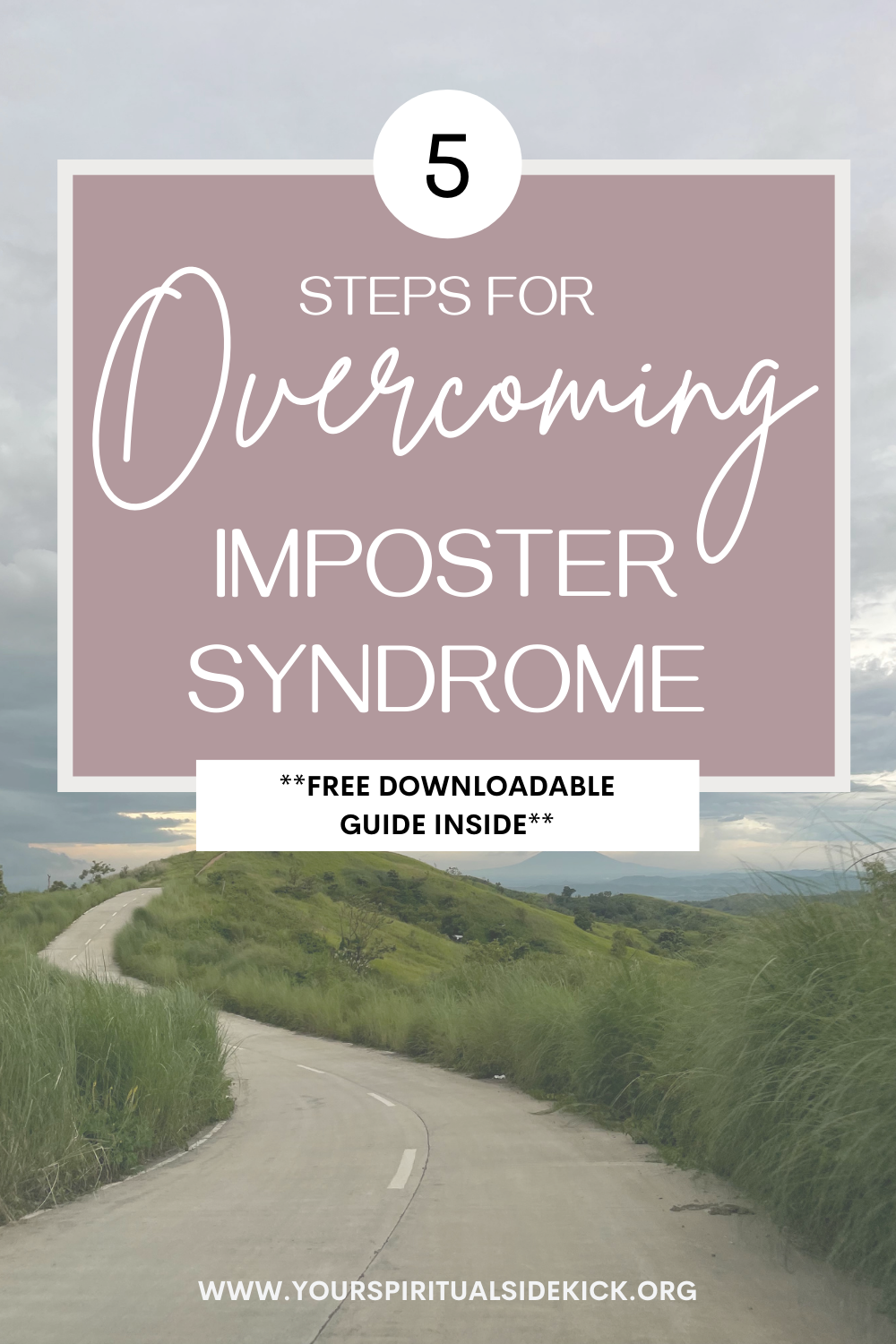5 Steps to Overcoming Imposter Syndrome
Have you ever felt like you are a fraud? Like you don’t actually belong in the positions or relationships that you're in? Do you ever feel like you don’t deserve what you have, like you haven’t earned it? Then you may be experiencing Imposter Syndrome.
Now, Imposter Syndrome is not actually a diagnosable condition but it is a common experience that many people have. This is when you feel like an imposter either in a particular part of your life or throughout your life as a whole. It is often related to feelings of low confidence and self-worth. It stems from not being able to believe in yourself and your capabilities.
It is so easy to get stuck in this mindset and let it hold you back from the things you are wanting to accomplish. It can almost feel comforting at times because, ultimately, it is the mind trying to protect you from potential difficulties or failure. But the longer you allow yourself to make decisions based off of Imposter Syndrome, the harder it is to move past it.
Below I have compiled the 5 most important steps to take in order to overcome Imposter Syndrome. So if you are ready to stop feeling like a fraud in your own life and start moving towards your goals, then keep on reading.
*This post may contain affiliate links. I may receive a commission on products or services purchased through those links. However, I do not promote any product or service that I do not fully support or believe in.
Stop Fighting Who Your Are
The first step towards getting unstuck from Imposter Syndrome is to stop fighting against who you are and start accepting yourself. We spend so much time wishing we were different or being upset that we are a certain way. All that time and energy that we spend on fighting ourselves is time and energy that we could be using to improve ourselves.
Making Changes to Yourself
By focusing so much on what you don't like about yourself, you are taking away from your ability to actually change those things. For example, let's say you are unhappy with your physical appearance and would like to lose some weight. Many people get upset with themselves for “letting themselves go” or for not starting their health journey sooner. But then all of a sudden their motivation to eat healthy or exercise is much lower because they have been so critical of themselves, leading to a loss of trust or belief in themselves.
If you would start this situation from a place of acceptance and compassion, you would be much more likely to be successful in eventually changing the situation. We tend to operate from a belief that criticism is a better motivator than kindness when the opposite is actually true.
Making Changes to your Perspective
Wanting to live a life where you are constantly growing and evolving is a great way to potentially avoid Imposter Syndrome. However, sometimes we view parts of ourselves as problems or wrong when really it is our perspective of that part that is skewed.
Take some time to look at the various aspects of you more objectively to determine what would be beneficial to change, and what parts you are judging unnecessarily. Is this part of you actually holding you back, or are you holding yourself back because this part of you isn't something you wanted or expected? Figure out the difference between the two before you decide to make any changes to yourself.
Improve your Relationship with Yourself
So we talked about how accepting yourself is an important step to removing imposter syndrome from your life, but let's take that a step further. Now I want you to focus on your love for yourself. Some of you may have just cringed or rolled your eyes at that statement, but stick with me for a second.
Yes I know loving yourself sounds like that cliché, hippy-dippy idea that not many people take seriously. But my whole mission in this world is to change that, even if it's only for a few people. We put so much focus in our lives around the love we feel for other people and never second-guess the importance of that.
Why should it be different for ourselves?
Why is it normal to want to love other people but weird to want to love ourselves? So this is me giving you permission to make improving your relationship with yourself a priority in your life! Now you may be asking, well how do i do that?
Great question, thank you for asking!
Simply put, you increase your love for yourself the same way you would work to build love for someone else. You spend quality time with them, you get to know them, you communicate with them frequently and effectively, you treat them with kindness and respect. See where I’m going with this?
You can do all these same things with yourself as well. Make a few small, intentional changes in any of these areas and you will begin to see your love for yourself grow. If you love yourself, then along with that comes your belief in yourself, which is the direct enemy of Imposter Syndrome.
Want to really dive deep into your self-love journey??
Well I have a once in a lifetime opportunity for you! What if I told you that you could learn all about how to love and accept yourself from 30 of the most well known experts on the topic from the comfort of your own home? Sounds a bit too good to be true? Well my friend, I am here to tell you that it is absolutely 100% true!
The Self-Acceptance Summit hosts 30 teachers who are all life long experts in the field of self-love. You will learn the ins and outs of your relationship with yourself and how to better it for good! You do not want to let this opportunity get away because I promise that it will transform your life! So if you are ready to finally begin loving yourself unconditionally, enter your info below and begin on your journey!
Acknowledge Your Accomplishments
I am just gonna be really blunt with this step. STOP DOWNPLAYING YOUR ACCOMPLISHMENTS! There I said it.
I know we have all been there. When talking about things we are doing or have done we use words like “just” or “only” or “kind of” to minimize the awesomeness of what we did. Women in particular are guilty of this most often because somewhere down the line we were taught that it is impolite or selfish to brag about ourselves. We were taught to stay small so we don’t make other people feel bad or uncomfortable.
But I am calling bullshit on this one!
By not allowing yourself to recognize the importance of even the small things you're doing throughout your life, you are effectively killing your belief in yourself. Imposter Syndrome comes from the place in our minds that is telling us that we are not good enough or not capable. The way to combat that is to show it proof that we are capable based off of past successes. But if you are telling other people (and let's be honest also yourself) that these accomplishments aren't worthy of recognition, then your mind won't count them as worthy of proof against feeling like an imposter.
The little things can quickly add up to be the big things, so take the time to acknowledge all of your accomplishments big and small. The more evidence you can collect of your proven abilities, the easier it will be to work your way out of Imposter Syndrome.
Stop Comparing Yourself to Others
If you don’t take anything else away from this post I want you to walk away with this. Comparison will (almost) never lead to a helpful situation. Comparing yourself to other people, especially online, will most often lead directly to Imposter Syndrome. You are comparing your reality or even your negative skew on reality, to someone else’s edited version of themselves.
On social media, and even offline, we get to choose what we show to others about us. We don’t give them the full picture of what's going on in our world. So it will always be an edited version of ourselves. That comparison between an edited version of a person and the whole picture is apples and oranges. You cannot accurately compare the two.
Instead of comparing yourself to someone else, start comparing yourself to your past self or the ideal version of yourself you eventually want to be. Look to see how far you have come over time and determine where you want to continue to grow in the future. You can gain ideas and inspiration from other people but avoid direct comparisons because they will always be misinformed.
Put in the Work
The final step in overcoming Imposter Syndrome is a simple one but not always easy. You have to put in the work. What I mean by that is if you want to believe that you're good at something or capable of something, then do the work to get there. Take the classes, put in the practice time, make it a priority in your life.
Yes the mindset work that you put in for the other steps is vital for getting out of feeling like an imposter, but you also have to earn that worthiness as well. You aren’t going to be great at everything you do as soon as you start it, so put in the effort to become great.
Putting in the time and energy to get better at something will add to that batch of evidence we were talking about earlier. It gives your mind more proof that you are not an imposter because you can physically see the improvements you are making in that area.
If you want more support in your journey in believing in yourself and snuffing out Imposter Syndrome for good, sign up below to get my FREE downloadable guide to overcoming self-doubt for good. This guide will walk you through how to feel confident in your self and your decisions through focus on the mind, body, and soul!


